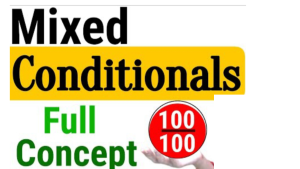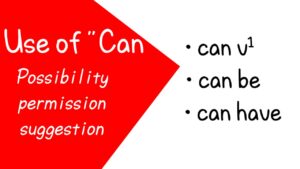Present Perfect Tense हिन्दी में सीखीए और वो भी easy Examples के साथ बस कुछ ही मिनटों में।
Present Perfect Tense क्या है ?
Tips to learn Tense with examples ? इस Tense में अक्सर लोग confused होते हैं, तो आज मैं share करुंगा tricks to remember it. If I am not wrong, Tense, Modal Verbs, preposition, conditional sentences are such things that often frighten the students.
But no worries, I am going to make it a simpler and easier post so that each one of you can figure it out easily.
What is present perfect tense in English grammar ?
Examples:
वह बाज़ार जा चुकी है। “या” वह बाज़ार गई है।
मैं पत्र लिख चुका हूं। ‘या’ मैंने पत्र लिखा है।
हिंदी वाक्यों के अंत में ( है, हैं , हो ) ज़रूर से रहे तब यह Present perfect tense होगा।
Structure of positive sentence:
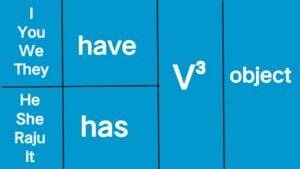
जैसा कि आप ऊपर चित्र में देख रहे हैं। I/you/we/they और कोई भी plural subject के साथ “Have” का प्रयोग करते है।
He/she/ It / name / और कोई भी third person singular number के साथ “Has” का प्रयोग करते हैं। अब कुछ उदाहरण से समझते हैं।
Examples :
1) मैंने आज उसे देखा है। I have seen him today.
2) तुम आवेदन पत्र लिख चुके हो। You have written an application.
3) हमने ताजमहल घूमा है। We have visited the Tajmahal.
4) वे लोग कहीं गये हैं। They have gone somewhere.
5) वह भोजन बनाई है। She has prepared food.
6) उसने मछली पकड़ा है। He has caught a fish.
7) बच्चा सो गया है। The baby has slept.
Exercise 1स्कूल बंद हो चुका है। हमने किताब खरीदा है। वह घर गई है। रेल आ चुकी है। पुलिस पहूंच गई है। पिताजी पैसे दिए हैं। मेरा दोस्त दिल्ली गया है। फिल्म शुरू हो चुकी है। राकेश अंग्रेजी बोला है। नीतू घड़ी बेची है।
Structure of Negative sentences :
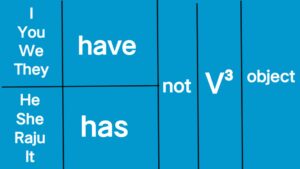
Examples :
1) मैंने कुर्सी नहीं तोड़ा है। I have not broken the chair.
2) हमने उसे नहीं बुलाया है। We have not called him.
3) वे लोग यहां नहीं आएं हैं। They have not come here.
4) वह आम नहीं खाई है। She has not eaten a mango.
5) उसने मुझे नहीं बताया है। He has not told me.
6) हमलोग कहानी नहीं पढ़े हैं। We have not read a story.
7) मैंने ऐसा नहीं कहा है। I have not said so.
Exercise 2
मैंने नहीं सोचा है। तुमने उसे नहीं पीटा है। हमने कुछ नहीं किया है। उसने टिकट नहीं दिया है। वे लोग बाहर नहीं गये हैं। बच्चा नहीं चिल्लाया है। मैच शुरू नहीं हुई है। लड़की पटना नहीं गई है। मदन गांव नहीं गया है। बारिश शुरू नहीं हुई है। ममता सब्जी नहीं काटी है।
Structure of Interrogative sentences :
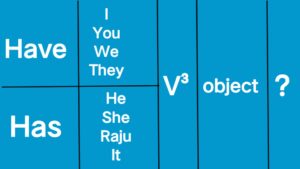
Interrogative का मतलब होता है “प्रशन- question”। इसमें सबसे पहले Have/ Has फिर subject, तब V³ third form of verb रहेगा और उसके बाद object फिर question mark❓
Example :
1) क्या वह कार खरीदा है ? Has he bought a car ?
2) क्या तुमने चोर को देखा है ? Have you seen a thief ?
3) क्या उसने ग़लती किया है ? Has he made a mistake ?
4) क्या आपका भाई दुबई गया है ? Has your brother gone to Dubai ?
5) क्या रोहित ने नियम तोड़ा है ? Has Rohit broken the rule ?
6) क्या ट्रेन आ चुकी है ? Has the train arrived ?
Exercise 3क्या तुमने सवाल पूछा है ? क्या किसान खेत गया है ? क्या आदमी जिम्मेदारी भूल गया है ? क्या रानी ने घर सजाया है ? क्या सचिन क्रिकेट खेला है ? क्या आपने ख़बर सुना है ? क्या लड़कियां स्कूल गई हैं ? क्या जैक ने फल तोड़ा है ? क्या आपने पैसे कमाएं है ?
Structure of interrogative sentences (Wh- Questions) :
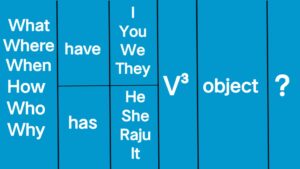
जैसा कि आप ऊपर चित्र में देख रहे हैं। Wh-Words फिर I/you/we/they/He/She/It/ name और फिर verb third form उसके बाद object, फिर question mark❓ कुछ उदाहरण देखिए।
Examples :
1) तुमने क्या किया है ? What have you done ?
2) वह कब आई है ? When has she come ?
3) वह काम कैसे किया है ? How has he done the work ?
4) कलम किसने दिया है ? Who has given a pen ?
5) वे लोग पेड़ क्यों काटे हैं ? Why have they cut down trees ?
6) लड़के कहां गये हैं ? Where have boys gone ?
Exercise 4तुमने ऐसा क्यों किया है ? वह कपड़ा कहां रखा है ? तुम्हें किसने बताया है ? मोबाइल किसने चुराया है ? बच्चा क्यों रोया है ? मंजर कार कैसे चलाया है ? हमनें उसे क्यों डांटा हैं ? रोज़ी दिल्ली से कब आई है ?
Use of “so far, already, yet and ever in present perfect tense
So far – अब तकExample :
1) मैंने अब तक नाश्ता नहीं किया है। So far I haven’t taken breakfast.
2) अब तक मेहमान नहीं आएं हैं। So far the guests have not come.
3) तुम अब तक नहीं समझे हो। So far you have not understood.
Already – पहले हीExamples :
1) वह पहले ही बोल चुका है। He has already spoken.
2) वे लोग पहले ही यहां आ चुके हैं। They have already come here.
3) उसने पहले ही सब कुछ कर दिया है। He has already done everything.
Ever – कभीExamples :
1) क्या कभी आपने सांप देखा है ? Have you ever seen a snake ?
2) क्या कभी वे लोग अमरीका गये हैं ? Have they ever been to America ?
3) क्या कभी मीरा गाना गाती है ? Has Mira ever sung a song ?
Yet – अभी तकExamples :
1) बस अभी तक नहीं पहुंची है। The bus has not come yet.
2) अभी तक बारिश नहीं हुई है। It has not rained yet.
3) वे अभी तक नहीं सोए हैं। They have not slept yet.
4) लालू अभी तक पटना नहीं आए हैं। Mr. Lalu has not come to Patna yet.
Never – कभी नहींExamples :
1) मैंने शेर कभी नहीं देखा है। I have never seen a lion.
2. वे लोग कभी कार नहीं चलाये हैं। They have never driven a car.
3) उसने कभी झूठ नहीं बोला है। They have never told a lie.
4) लाता ने कभी कहानी नहीं लिखा है। Lata has never written a story.
I think, I have been able to explain about Present perfect tense in the blog. Hope guys, it may have been useful for you.

